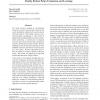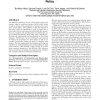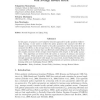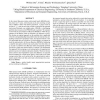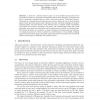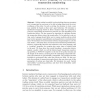133
click to vote
ICASSP
2011
IEEE
14 years 5 months ago
2011
IEEE
Abstract—We consider the restless multi-armed bandit (RMAB) problem with unknown dynamics. At each time, a player chooses K out of N (N > K) arms to play. The state of each ar...
116
click to vote
CORR
2011
Springer
14 years 5 months ago
2011
Springer
We study decision making in environments where the reward is only partially observed, but can be modeled as a function of an action and an observed context. This setting, known as...
115
click to vote
TSP
2010
14 years 8 months ago
2010
We formulate and study a decentralized multi-armed bandit (MAB) problem. There are distributed players competing for independent arms. Each arm, when played, offers i.i.d. reward a...
117
click to vote
TISSEC
2010
14 years 8 months ago
2010
The SELinux mandatory access control (MAC) policy has recently added a multi-level security (MLS) model which is able to express a fine granularity of control over a subject'...
152
click to vote
JMLR
2010
14 years 8 months ago
2010
In this paper, we propose a novel adaptive step-size approach for policy gradient reinforcement learning. A new metric is defined for policy gradients that measures the effect of ...
104
click to vote
JMLR
2010
14 years 8 months ago
2010
Imitation Learning, while applied successfully on many large real-world problems, is typically addressed as a standard supervised learning problem, where it is assumed the trainin...
168
click to vote
EIS
2011
14 years 9 months ago
2011
Policy languages (such as privacy and rights) have had little impact on the wider community. Now that Social Networks have taken off, the need to revisit Policy languages and real...
132
click to vote
CORR
2010
Springer
14 years 10 months ago
2010
Springer
In the classic Bayesian restless multi-armed bandit (RMAB) problem, there are N arms, with rewards on all arms evolving at each time as Markov chains with known parameters. A play...
113
click to vote
CJ
2010
14 years 11 months ago
2010
A policy for a minimal reactive agent is a set of condition-action rules used to determine its response to perceived environmental stimuli. When the policy pre-disposes the agent t...
132
click to vote
ICTAC
2009
Springer
14 years 11 months ago
2009
Springer
Online trading invariably involves dealings between strangers, so it is important for one party to be able to judge objectively the trustworthiness of the other. In such a setting,...

